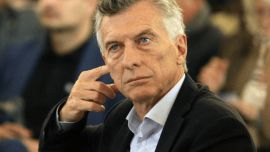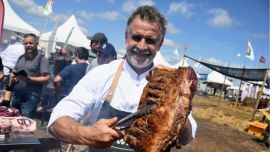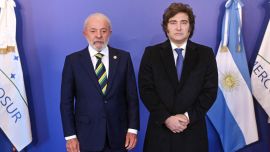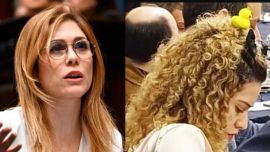There’s a civil war raging between President Alberto Fernández and his second-in-command, Cristina Fernández de Kirchner. Said conflict is tearing the ruling coalition apart at the seams, risking a hard break that would have a troubling effect on Argentina. To the delight of the opposition, this proxy war between Alberto and his own veep exposes the ineptitude of the pan-Peronist Frente de Todos front, apparently paving the way for a change in government in 2023. Unfortunately, we’re still a year and a half away from the presidential elections and pressing issues are pushed to the background, further alienating those disillusioned with the political system. And while the opposition is trying to figure out whether Horacio Rodíguez Larreta will be able to clinch the nomination, the whole of the círculo rojo (Argentina’s group of influential decision-makers) is waiting to see whether Cristina or Alberto edges the other one out.
Throughout the week, Cristina set her minions on the president, decidedly looking to undermine his authority while calling for the head of Economy Minister Martín Guzmán and whoever got in her way. The main man was none other than Andres “the Crow” Larroque, community development minister of Buenos Aires Province and one of the leaders of the Kirchnerite political group La Cámpora. Aggressively, as is his way, The Crow told journalist María O’Donnell that “the government is ours” and that Alberto was trying to “take it to his nightstand,” while accusing the president of mounting media operations against Cristina. “He’s the one permanently trying to force a break,” declared the official in Governor Axel Kicillof’s administration. What had previously been bullets fired in Guzman’s direction had finally been aimed directly at the president.
Yet, it was none other than Cristina who came out to make it clear where she stands. Apparently playing “good cop” to Larroque’s tough guy stance, she blamed the media for trying to paint a “debate” as a “fight,” and said she has no need to “dispute power.” It was she who had the vision and grandeur to anoint Alberto Fernández, a former associate who spent years criticising her as he became increasingly irrelevant from a political standpoint, the veep claimed. She even tolerated Alberto’s decision to pick Matías Kulfas as Productive Development Minister, an economist who had written harsh words about Cristina’s brand of Kirchnerism and apparently told her envoys the macroeconomic problems occurred during her second erm were due to a lack of dialogue or “manners,” as she called them. Oh how wrong he was, she noted, seeing how this government had failed to tackle inflation given its unwillingness to face off with the powers that be. Thus, Mrs. Fernández de Kirchner sought to tone down the “media fight” with President Fernández while taking aim directly at Kulfas, giving Guzmán a break for now.
As she noted satirically in her speech — the former president was in Chaco Province, ruled by another former Cabinet chief of hers, Jorge Capitanich, in order to receive an honorary degree from the Austral Chaco University — Fernández de Kirchner's silences are interpreted and her words are misrepresented. A master of silence, Cristina ran her last two major campaigns by not speaking publicly. Both in the 2017 race for the Senate and the 2019 presidential election, the major part of Cristina’s electoral strategy revolved around her silence, which helped her improve in the opinion polls. Whenever she spoke, she dropped. In her speech in Chaco, while apparently toning down the fight with Alberto, she was actually saying: I’m the boss, I picked you, do as I say. But at the same time she was once again revealing an unexpected level of weakness, unable to tame a nobody who is in the Casa Rosada because she picked him.
The issue is not tactical but philosophical. It’s about how to understand reality and the true causes behind certain effects, particularly on the economy. For Cristina there’s a group of vested interests which work in the shadows to their benefit and at the expense of the people. They are the concentrated economic powers which she generally connects to the traditional families owning food production companies, aligned with “neoliberal” models, the global financial sector and in some sort of way egged on by the United States. The problem is not capitalism but market failure which leads to the concentration of wealth which must be redistributed. Inflation isn’t caused by printing money but an attempt by those sectors to keep workers’ wages at bay. In her worldview, capitalism has won the day but China is more efficient than the United States in its application of it. While she claims the categories of Left and Right have expired, her conception appears traversed by 20th century modernism and the Peronist youth ideologies of the 1970s.
To someone like Cristina, Alberto is nothing but a frivolous crowd-pleaser who tells everyone what they want to hear. She can’t tolerate his proximity to the ‘Titans of Industry’ whom she personally hates and certain media groups like Clarín. Thus, if the shallow law professor made a good pick to win the election but was unable to govern, he should share the reins, or directly hand them over.
Reports suggest the president and his veep haven’t spoken in weeks, something Alberto hinted at when he acknowledged receiving a message from CFK when his baby boy Francisco was born. There’s been a back and forth, apparently mediated by Congress Speaker Sergio Massa and a few other emissaries, but the positions appear irreconcilable. As Larroque noted, what they are looking for is greater influence in decision-making and a change in strategy on the economic front. As things go, it will be impossible to retain the Casa Rosada in 2023 and the political rumour mill centres on Cristina’s next moves. The most plausible option for the vice-president appears to be to send a representative to duke it out with Alberto in the PASO primaries, understanding her sector has little chances to win, while she would head the Senate list in Buenos Aires Province, where the expectation is that Kicillof will seek re-election. Interior Minister Eduardo ‘Wado’ de Pedro could be an option for the presidential ticket. And they would have to do something with Máximo Kirchner, who could make his way down to their beloved Santa Crúz Province, where Aunt Alicia Kirchner cannot go for another term.
There’s a philosophical divide in the opposition as well. Buenos Aires City Mayor Horacio Rodríguez Larreta launched his presidential campaign months ago, despite avoiding all talk of candidacies up until now. He’s building his team — the rumour says Hernán Lacunza would lead the Economy Ministry — and trying to reach a consensus with the political and social spectrum that would give him some 70 percent margin to work with. Former president Mauricio Macri is waiting to see if he throws his hat into the ring for a “second half,” while retaining former Security minister Patricia Bullrich as his placeholder to keep the mayor at bay. The Radical Civic Union would dearly love a presidential candidate but could be content with the vice-presidency. Neurosurgeon Facundo Manés could take that spot. Liberal economist Javier Milei could be their black swan after an inclusion in the Juntos por el Cambio coalition was discarded.
As usual, the political battle takes centre stage and it feels as if we’ve already stumbled onto the campaign.



















Comments